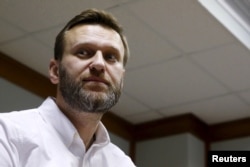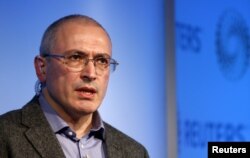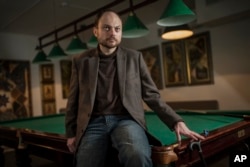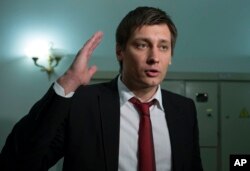Two years after he was killed near the Kremlin, Boris Nemtsov can still attract crowds of supporters. But his death left in tatters Russia's opposition movement, which is struggling with infighting and seems unable to rally behind one unifying figure.
In the largest Russian opposition protest in months, thousands marched Sunday across Moscow to commemorate Nemtsov's life, demand a thorough investigation of his death and to denounce President Vladimir Putin. The procession went to the bridge where Nemtsov was gunned down on Feb. 27, 2015. People also took to the streets in other cities, including St. Petersburg and Nizhny Novgorod, his hometown.
Once a deputy prime minister tipped to be a possible successor to former President Boris Yeltsin, Nemtsov carved a unique role for himself as an opposition leader who still maintained contacts inside the Kremlin and could open doors abroad, from Brussels to Washington.
A look at the Russian opposition:
Alexei Navalny
The main force behind large protests against Putin in 2011-12, Alexei Navalny finished second with about a third of the vote in Moscow's 2013 mayoral election, even though he had just been convicted of fraud charges that were widely seen as politically motivated.
Sentenced to five years in prison, he was freed and allowed to run pending an appeal that eventually led to a suspended sentence. His guilty verdict later was overturned by the European Court of Human Rights, which ruled his right to a fair trial had been violated. A retrial ended Feb. 8 with another guilty verdict and a suspended sentence.
That ruling bars the charismatic anti-corruption activist from running for president in 2018, when presumably Putin would seek re-election to another six-year term. Navalny and his associates are preparing his candidacy anyway.
The 40-year-old lawyer has endured so many court cases targeting him and his family that he had to deliver seven closing arguments in separate cases in the past four years.
"I spent one out of the past four years under house arrest, I have had several similar court cases during this time, my brother was sent to prison, and I spent most of this time barred from leaving town," Navalny said this month. "But we still continue to publish numerous investigations, we have been doing our best unmasking those thieves and this gang that usurped power in Russia."
Even though his prospects for running in 2018 are dim, he is raising funds for the campaign and traveling across Russia to meet with volunteers. The opening of his campaign headquarters in St. Petersburg drew several hundred people who lined up for blocks.
Mikhail Khodorkovsky
An oil tycoon who was once Russia's richest man, Mikhail Khodorkovsky was arrested in 2003 in a tax evasion and money-laundering case that was seen as revenge for his challenging of Putin's power. After serving 10 years in prison, he was pardoned right before the 2014 Sochi Olympics.
Since his release, Khodorkovsky used some of his remaining wealth that was not seized by the government to help fund an independent news website, back national and local Russian legislative candidates, and give legal support to political prisoners. But he has not been to Russia since his release, and his emigre status makes it almost impossible for him to enjoy wide popularity inside Russia.
Legal troubles continue for the 54-year-old former oligarch. Investigators searched the homes of several employees of his charity and last year declared Khodorkovsky arrested in absentia in connection with the 1998 killing of a Siberian mayor — charges he dismisses as a political vendetta.
Vladimir Kara-Murza Jr.
The coordinator at Khodorkovsky's Open Russia foundation and a close associate of Nemtsov, Vladimir Kara-Murza Jr. is largely unknown to most Russians. Yet the 35-year-old's wide contacts in the West arguably make him a thorn in the Kremlin's side.
Kara-Murza suffered two almost identical illnesses in 2015 and again this month that his doctors have called poisonings. Kara-Murza nearly died from kidney failure in 2015, although doctors have not identified the poison. Both times, he spent several days in a medically induced coma. After the most recent incident, his family sent his blood samples to a private lab in Israel to determine the toxin. He was flown out of Russia for treatment.
Russian state media targeted Kara-Murza alongside Nemtsov for his lobbying in the West, openly calling him a traitor.
Kara-Murza has traveled to the U.S., Canada and eastern Europe, pushing a law that targets Russian officials involved in rights abuses. In 2012, the U.S. Congress passed the Magnitsky Act, named for the late Russian whistleblower Sergei Magnitsky. It was a precursor for the worsening of U.S.-Russia relations, which hit a post-Cold War low in 2014 when Russia annexed the Crimean Peninsula.
Dmitry Gudkov
Elected to the State Duma in 2011, Dmitry Gudkov is one of the few lawmakers who have voted against Kremlin-backed legislation, from the U.S. adoption ban to the annexation of Crimea.
Gudkov used his lawmaker's privileges to press officials about massive spending on the 2014 Olympics and about Nemtsov's killing. City officials have rejected petitions to rename the bridge after the slain politician or put up a commemorative plaque, and utility workers have repeatedly removed flowers, photos and candles left by mourners for Nemtsov — as they did again early Monday.
Gudkov, who lost a re-election bid for the Duma last year, has said he will run for mayor of Moscow in 2018.
In a country where the dominant state-owned media refuses to give air time to the opposition, candidates like Gudkov have a long-term strategy of just getting a foot in the door, rather than trying to convince voters they can beat a Kremlin candidate.
"We need to be prepared: Not just from campaign to campaign, but permanently, build a strong team," Gudkov told Ekho Moskvy radio this month. "There will be changes in public consciousness, and we should be ready for that."








